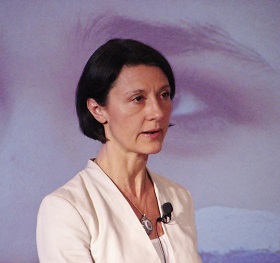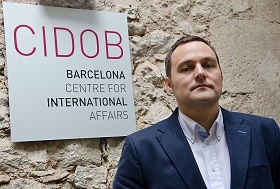In the midst of FIFA 2018 hosted in various Russian cities, RIAC welcomed another round of the EU–Russia Expert Network on Foreign Policy. RIAC Website editor Maria Smekalova talks migration, bilateral relations, and football matters with Kadri Liik, Senior Policy Fellow at ECFR, and Nicolas de Pedro, Head of the Russia and Eurasia Program at CIDOB.
In the midst of FIFA 2018 hosted in various Russian cities, RIAC welcomed another round of the EU–Russia Expert Network on Foreign Policy. RIAC Website editor Maria Smekalova talks migration, bilateral relations, and football matters with Kadri Liik, Senior Policy Fellow at ECFR, and Nicolas de Pedro, Head of the Russia and Eurasia Program at CIDOB.
How is the latest migration agreement going to influence the internal agenda in your country and in the EU as a whole?
Kadri Liik: Too early to say, I think. It depends a lot on whether the decision is going to be satisfying for Germany and in Italy, where the problems have been very noticeable. I come from Estonia, based in London, I don’t think these countries have a big stake. Estonia has a stake in European unity, it does worry about migration, it wants to have control, but at the same time, it is not a main destination for migrants. And the UK is at the moment too busy coping with Brexit and its timing, and that’s complicated enough. Let’s see, I think there will be a follow up to that.
Nicolas de Pedro: Well, that is a very timely and topical question. It is pretty difficult, because frankly speaking, no one is very sure about this. There is a big agreement on the potential risk related to the issue of migration, not specifically because of migration in itself, but because of the divide between the member states. This unfortunately has the potential to put a lot of tension within the EU, that can lead even to its own implosion or collapse, because this has put a lot of stress on the Schengen framework.
Spain is a little bit of a peculiar country when it comes to the issue of migration. So far the new government has changed the position of the state completely, at least at the rhetorical level, by claiming to assume a leading role and being very active in accepting several ships of migrants coming from the sea. Of course, this has a PR dimension, it is something that has a very visual impact. It all depends on how the new government wants to position itself in the eyes of Spanish voters. In general, migration is not that much of a sensitive or controversial issue within Spain so far, compared to Hungary, Germany and in other parts of Central Europe. This may change in the future, but so far there is no xenophobic movement that is strong enough to be a relevant political actor. At the local level, there have been some successful parties with a xenophobic or anti-migration and anti-refugee agenda.
In 2018, what factors do you think determine the current state of Russia – EU relations?
Kadri Liik: Well, what influences? Ukraine, of course, does: the annexation of Crimea, invasion of Donbass. That is clearly a big thing in EU – Russia relations. Europe cannot agree to it, Russia sees their reasons for that differently. Europe has made progress on the Minsk agreement, that’s a key for further improvement of relations, and I don’t see how that could change. The second factor is Donald Trump’s presidency, as it also creates lots of problems for the Europeans, Transatlantic unity, which is not so granted anymore, at least not in all spheres. It also complicates the situation for Russia because Trump is unpredictable, and Russia finds it hard to deal with him as well. But here again, where this as a whole is headed, it’s too early to say.
Nicolas de Pedro: Well, with Russia and the EU we still have the problem of the lack of trust or the strategic distrust, but there is a growing perception of the growing non-compatible nature of our long-term visions, of how we see the European security framework, and specifically nowadays the issues of common position, but very unlikely common action, which is the Iran nuclear deal, because both Russia and the EU support this deal, whereas the US don’t. Overall, supports stability and security in general terms, but when it comes to details, this becomes very different and I think it’s going to be, for instance, easier to find some common understanding on Syria, rather than on Ukraine. It is too sensitive because the positions are completely confrontational. Then, it depends on how it evolves, but if the EU continues to perceive that Russia is meddling or interfering with elections and issues, including social media activity and these media outposts like Russia Today and Sputnik, that of course will maintain this distress at a very high level.
What do you think can help us improve things? Taking into consideration that the situation in Ukraine is not going to be solved in the near future, what do you think could actually help us out?
Kadri Liik: EU and Russia? If the Donbass situation is going nowhere, then certain aspects of relationship will remain blocked. There could be some cooperation on other issues: Iran for example, is one typical case where the EU and Russia find themselves on the same side of the barricade. However, we don’t have enough leverage to make a difference, because the US holds so many cards when it comes to trade, that it would be hard for the EU and Russia to really play a decisive role on Iran.
To be honest, I don’t expect a quick improvement. I think changes will come over time, when we will be able to reevaluate some of our positions, Russia could think about Donbass and Ukraine, Europe might need to review as to what extent its norms are universal, to what extent it needs to make up with the fact that much of the world is not going to share them anytime soon.
We are talking here at the height of the World Cup. How would you evaluate the impact of it on Russia’s image as a whole? Could it help us improve relations with other countries?
Kadri Liik: I think the World Cup is good for Russia actually. Russia is one of the most isolated countries in Europe, it is said that only 10% of Russia’s population has travelled abroad. So, it is really cool to bring these crowds of foreigners from exotic places like Colombia or Mexico to provincial Russian cities like Saransk. I think it could give some energy to the debate in Russia, and to how Russia feels about itself.
The foreigners get to see Russia that is not directly related to the President and the elite.
But I think it is also different for Russians, you know. When Russians go to Crimea, the event that is very popular for large parts of the population and sort of very political, there is a rally to their flag. But football is different, football is cheering, it’s apolitical fun, it’s not antagonistic.
While football does help with the internal situation in Russia, it cannot do much for international relations. Problems are here, they are not going to disappear. I think football could help Russia’s self-esteem, and that, in turn, might make Russia more self-confident to tackle some other problems, where it is unnecessarily stubborn.
Nicolas de Pedro: Not between EU and Russia, but I think so far the World Cup has been successful for Russia and the Kremlin. In terms of image so far, and it will hopefully remain like this, it has been very positive for the country. Nice stadiums, very nice environment in the stadiums, good management of the organization, no violence, no problems between fans, no problems with hooligans – so far the image is good. I’ve seen many people from Colombia and Mexico and listened to what they were saying, and from what I could hear their experience was very positive. Secondly, it has already been a great success for the Russian team, nobody was expecting that. I could say that World Cup so far has been more successful than the Sochi games, but I don’t think that it will have a big impact specifically in the EU – Russia relations.







